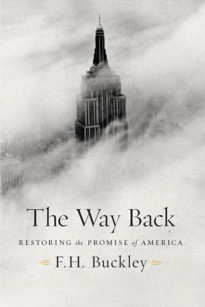The liberal-conservative ideological axis is increasingly irrelevant, writes F.H. Buckley in a new column for USA Today. If you really want to understand the seemingly improbable rise of our protest candidates, the place to look is the corruption-virtue axis—just as our founders did 240 years ago.
Writes Buckley:
Eighteenth century Britons took corruption for granted. “Men … no more dreamt of a seat in the House in order to benefit humanity than a child dreams of a birthday cake that others may eat it,” wrote Sir Lewis Namier. The patriots were well aware of this, from the writings of John Trenchard and Thomas Gordon (Cato’s Letters) and Viscount Bolingbroke, and also from the reports brought back to America by visitors to Britain, such as John Dickinson. “Bribery is so common that it is thought there is not a borough in England where it is not practiced,” he observed.
Closer to home, the patriots thought that the British had exported their corruption to America through the officials they had appointed. In Massachusetts, for example, Gov. Thomas Hutchinson had created a system of patronage that John Adams thought amounted to a tyranny. At one point, Hutchinson was simultaneously the colony’s lieutenant governor, a member of its House of Representatives and its chief justice. As for the tea the Sons of Liberty threw in Boston harbor, Hutchinson’s sons had been waiting to take delivery.
The patriots had studied John Locke, but they had also read the history of the fall of the Roman republic and thought that monarchies were always going to be corrupt. Monarchies would depend upon a swarm of courtiers who’d milk the public purse. We can do better, said the patriots, by adopting a republican form of government with a regime of disinterested civic virtue. The Constitution they drafted, at their 1787 Philadelphia convention, was designed as an anti-corruption covenant that would check “cabal, intrigue and faction.” The most consequential issue they debated was how presidents would be chosen, and when the question was put to them it was the fear of corruption that carried the day.
We are in a similar moment, says Buckley, who attributes the success of Sanders and Trump to the entrenched corruption of our political establishment.
Read the full article here—and learn more in Buckley’s The Way Back: Restoring the Promise of America.
